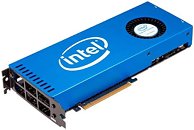- Joined
- Oct 9, 2007
- Messages
- 47,427 (7.51/day)
- Location
- Hyderabad, India
| System Name | RBMK-1000 |
|---|---|
| Processor | AMD Ryzen 7 5700G |
| Motherboard | ASUS ROG Strix B450-E Gaming |
| Cooling | DeepCool Gammax L240 V2 |
| Memory | 2x 8GB G.Skill Sniper X |
| Video Card(s) | Palit GeForce RTX 2080 SUPER GameRock |
| Storage | Western Digital Black NVMe 512GB |
| Display(s) | BenQ 1440p 60 Hz 27-inch |
| Case | Corsair Carbide 100R |
| Audio Device(s) | ASUS SupremeFX S1220A |
| Power Supply | Cooler Master MWE Gold 650W |
| Mouse | ASUS ROG Strix Impact |
| Keyboard | Gamdias Hermes E2 |
| Software | Windows 11 Pro |
It looks like Intel is designing its discrete graphics processor at a breakneck pace, by a team put together by Raja Koduri. Its development is moving so fast, that the company could be ready with a working product to show the world by the 2019 International CES, held in early-January next year. Intel's development of a graphics processor is likely motivated by the company's survival instinct to not fall behind NVIDIA and AMD in making super-scalar architectures to cash in on two simultaneous tech-booms - AI and blockchain computing.
A blessing in disguise for gamers is the restoration of competition. NVIDIA has been ahead of AMD in PC graphics processor performance and efficiency since 2014, with the latter only playing catch-up in the PC gaming space. AMD's architectures have proven efficient in other areas, such as blockchain computing. NVIDIA, on the other hand, has invested heavily on AI, with specialized components on its chips called "tensor cores," which accelerate neural-net building and training.

View at TechPowerUp Main Site
A blessing in disguise for gamers is the restoration of competition. NVIDIA has been ahead of AMD in PC graphics processor performance and efficiency since 2014, with the latter only playing catch-up in the PC gaming space. AMD's architectures have proven efficient in other areas, such as blockchain computing. NVIDIA, on the other hand, has invested heavily on AI, with specialized components on its chips called "tensor cores," which accelerate neural-net building and training.

View at TechPowerUp Main Site







